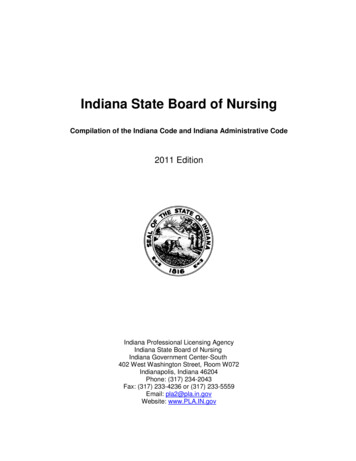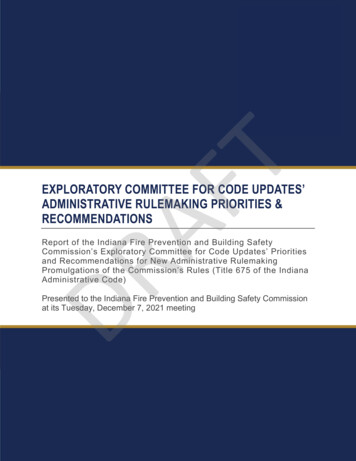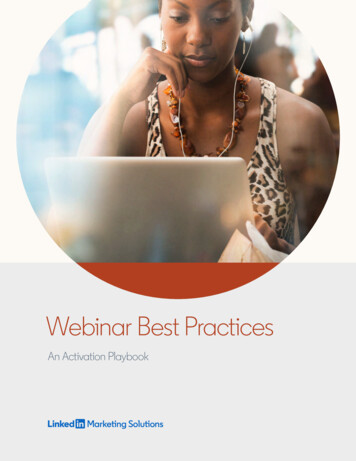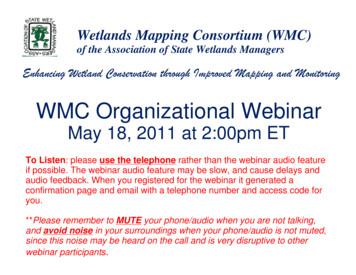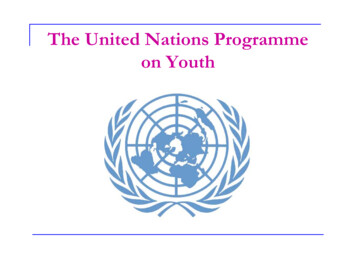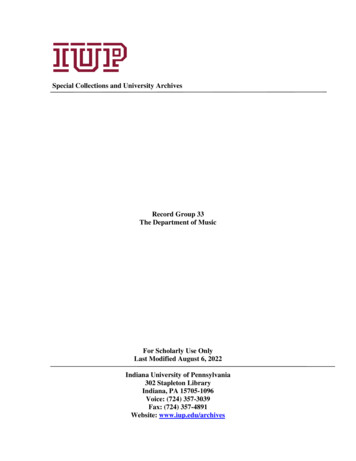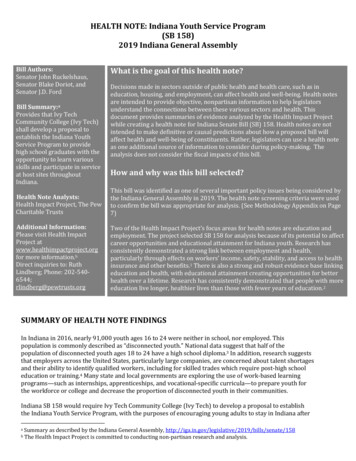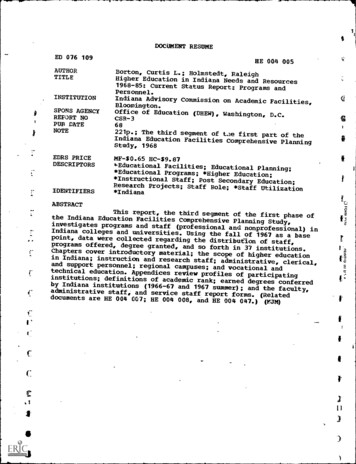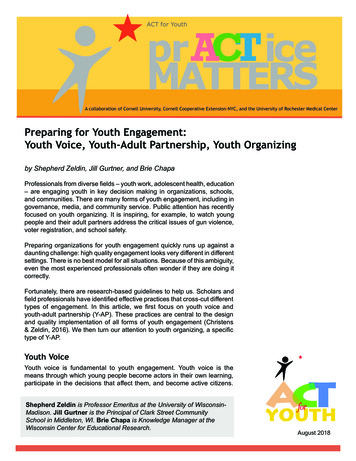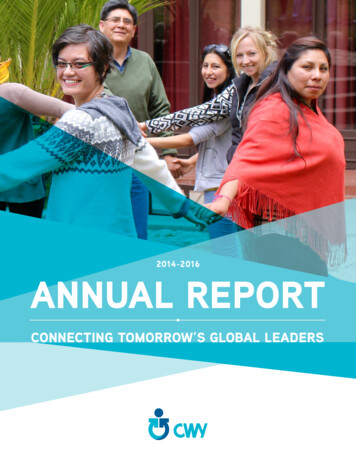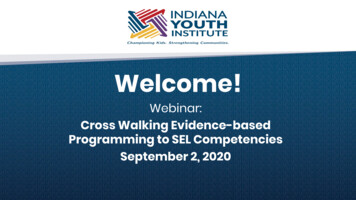
Transcription
Webinar:Cross Walking Evidence-basedProgramming to SEL CompetenciesSeptember 2, 2020
Who is IYI?Our mission is to improve the lives of all Indianachildren by strengthening and connecting thepeople, organizations, and communities that arefocused on kids and youth. We Do It For The Kids We Create Change We Work Together We Empower OurPartners And Peers We Advocate For Others
Using your GoToWebinar Control PanelIf you don’t see the control panel –click the orange arrowQuestionsDownload ResourcesIf you do not see this section, click VIEW in thetop menu and make sure HANDOUTS is checked
Presenter Introductions Dr. Kristine (Kristy) Eaton, Assistant Director, IndianaSchool Mental Health Initiative, Indiana University Dr. Sheila Dennis, Senior Lecturer, Indiana UniversitySchool of Social Work Kyle Miller, Coordinator of Social & EmotionalLearning, Westfield Washington Schools Anne Marshall, Neuro Educator, Tippecanoe SchoolCorporation
Indiana School Mental Health InitiativeSocial Emotional Learning (SEL): Intentions,Expectations, and ResourcesDr. Kristy EatonAssistant Director, Indiana School Mental Health InitiativeIndiana ike us on Facebook and follow us on Twitter @IN SMHIINDIANA INSTITUTE ON DISABILITY AND COMMUNITY
Indiana School Mental Health InitiativeSocial Emotional Learning DefinedWhat is Social Emotional Learning (SEL)?“SEL is the process through which children and adults understandand manage emotions, set and achieve positive goals, feel and showempathy for others, establish and maintain positive relationships, andmake responsible decisions.” CASELINDIANA INSTITUTE ON DISABILITY AND COMMUNITY
Indiana School Mental Health InitiativeWhy be Intentional About SEL?“Create the conditions for learning and educate the WHOLE child.”- from ISMHIImpact: RisingImpact: FallingAcademic achievementCrimeAttendanceMental illnessGraduation ratesSubstance abuse/addictionEmploymentPublic assistanceINDIANA INSTITUTE ON DISABILITY AND COMMUNITY
Indiana School Mental Health InitiativeIntentionally Teaching SEL CompetenciesIDOECASELINDIANA INSTITUTE ON DISABILITY AND COMMUNITY
Indiana School Mental Health InitiativeExpectations for Implementation of SEL in Indiana Every Student Succeeds Act (ESSA) of 2015 House Enrolled Act 1283 “Teacher Preparation Program Curriculum” Competencies, Guidance, and Resources (not mandates) Takes time to move through the implementation process and towards sustainability Building the plane or flying the plane?INDIANA INSTITUTE ON DISABILITY AND COMMUNITY
Indiana School Mental Health InitiativeIN SEL Resources for Schools & Communities Indiana Youth Institute (IYI) https://www.iyi.org SEL4IN Indiana Department of Education (IDOE) & Project Awarehttps://sel4in.orghttps://www.doe.in.gov/sebw Indiana School Mental Health Initiative (ISMHI)https://ismhi.Indiana.eduINDIANA INSTITUTE ON DISABILITY AND COMMUNITY
Indiana School Mental Health InitiativeUS SEL Resources for Schools & Communities The National Center for School Mental Healthwww.schoolmentalhealth.org Collaborative for Academic, Social, & Emotional Learning (CASEL) SEL4US The Aspen Institute National Commission on Social, Emotional, & Academic ssion-on-social-emotional- and-academicdevelopmentINDIANA INSTITUTE ON DISABILITY AND COMMUNITY
Indiana School Mental Health InitiativeSEL4US by StateWAVTNDMTORNVMNSDIDWYCOWIILKSKYMOCAAZOKNMTXWV VANCTNSCARMSAKPAOHINALGALAFLHIINDIANA INSTITUTE ON DISABILITY AND COMMUNITYMENYMIIANEUTNHMARICTNJDE MDDCWashingtonOregonTexasConnecticut
Optimizing School and Community Partnerships forSocial Emotional Learning and PreventionSheila Dennis, Ph.D., MSWINDIANA UNIVERSITY SCHOOL OF SOCIAL WORK
Building SEL Capacity for PreventionMain Questions to Address:How do community partners andschool organizations co-create a bridgefor integrating SEL competencies intoTier 1 Practices?INDIANA UNIVERSITY SCHOOL OF SOCIAL WORK
Addressing StudentWellness NeedsWhat are thePerspectives ofIndiana Educators?INDIANA UNIVERSITY SCHOOL OF SOCIAL WORK
Core Theme ofSurvey Outcomes:The GapAdministrators and educators are highlycommitted to supporting student wellnessinitiativesThere is not enough capacity to translatetheir commitment into realitySpecifically lack of shared vision andorganizational and community capacity.
Addressing Student Wellness in Indiana Public Schools:Four Key Findings (n 254)Four key findings produced through the data analysis align with this core theme:(1) Variability of schools’ interpretation and implementation approaches(2) The need for a shared roadmap for integration and evaluation(3) Gaps in the multi-systemic and school organization capacity(4) The central role of community partnersPDF to Report qwfH7J V3QGETU3S1cQxFZR/view?usp sharing
Finding our Way Together:Implementation Science andChange TheoryImplementationScienceChange tial ImplementationFull intenance and ProgressMonitoring6. Accountability and EvaluationSources: 26/https://www.theoryofchange.org
Partnering to Co-Create Organizational ChangeFive Essential Questions:1. What is the school district’s SEL literacy within an integrative MTSS framework.2. What are key stakeholders’ perspectives on the partnership?3. What is already in place and working for the school organization?4. How does our program align with the individual school and the district’s intendedoutcomes?5. Avoiding equity detours: How will our Tier 1 programming advance equity and anti-racism?INDIANA UNIVERSITY SCHOOL OF SOCIAL WORK
What is the school district’s SEL literacy within anintegrative MTSS framework?Start where the school communityis at in their understandingDefine SELCreate shared languageINDIANA UNIVERSITY SCHOOL OF SOCIAL WORK
What are key stakeholders’ perspectiveson the partnership?Formal and Informal Leaders Perspectives – Does key leadership support ourprogramming?Educator Perspectives – Will this program to add to my workload?Existing Student Services – How does our program support their work?Family Engagement – How do we leverage family strengths for collaboration?Sociopolitical Context – Any considerations related to parental rights and privacy?INDIANA UNIVERSITY SCHOOL OF SOCIAL WORK
What is already in place and working forthe school organization?
How does our program alignwith the individual schooland the district’s intended outcomes?1. Establish clear, agreed upon goals and outcomes2. Co-Create plan for evaluation and progress monitoring3. When possible, pilot smaller projects and build upon success and lessons4. Create small successes to celebrateINDIANA UNIVERSITY SCHOOL OF SOCIAL WORK
Avoiding Equity Detours:How will our Tier 1 programmingadvance equity and anti-racism?1. “Fix injustice not kids” – SEL is not meant to adjust mindsets orcultures in students of color2. Work on fixing conditions that marginalize students not using SEL toadapt to these conditions3. Anti-racism involves all school districts, not just urban settings.4. Embrace discomfort. Avoid pacing for privilege.Source: al-Equity-Detours-Gorski.pdfINDIANA UNIVERSITY SCHOOL OF SOCIAL WORKE
Sheila R. Dennis, Ph.D., MSWSenior LecturerMSW Schools Focus AreaIndiana UniversitySchool of Social Workdennis2@iu.edu@sheiladennisPhD
Westfield Washington SchoolsKyle MillerCoordinator of Social & Emotional Learningmillerk@wws.k12.in.usWESTFIELD WASHINGTON SCHOOLS
Who are we?WestfieldHigh SchoolWestfieldIntermediateSchoolBuildings: 9Monon TrailEnrollment:WestfieldMiddleSchoolGrowth: 24% since2008.8,446WashingtonWoodsF & R Lunch: 17%ShamrockSpringsOak TraceCary RidgeMaple GlenWESTFIELD WASHINGTON SCHOOLS
WESTFIELD WASHINGTON SCHOOLS
Phase 1Westfield Washington SchoolsSEL Implementation PlanCommonKnowledgeClimate / CultureConsistent PracticesShared BeliefsCommon LanguageEducational NeuroscienceMindfulnessCultural Considerate / EquityRestorative PracticesCompetenciesSkills / MindsetsPhase 2StrategiesSkillIdentificationCASEL CompetenciesIDOE CompetenciesSEL CurriculumIntegratedModelWhere is this skillalready integrated /where does it live?How do we makethe implicit explicit?How might weuse what weknow to impactinstruction andstudentlearning?Phase 3AcademicIntegration- PLC- Workshop Model- Units of Study- Collaborative LearningStructures- Direct SEL Instruction- TransitionsWESTFIELD WASHINGTON SCHOOLS
WWS Community Partners:WESTFIELD WASHINGTON SCHOOLS
Statements you may hear and questions you may want to askyourself.WESTFIELD WASHINGTON SCHOOLS
Statement # 1: We don’t need another thingto do!Question/s you may ask yourself: How might our program align with and integrate intowhat is already going on?How does our program build the identified SELcompetencies?Recommendations: Do your homework on the district, understand their priority areas and be prepared toanswer how your program supports the good work they are doing.WESTFIELD WASHINGTON SCHOOLS
Statement # 2: We don’t have money!Question you may ask yourself: How might we become aware of grant opportunitiesto fund our program, and how might we help schoolcraft a compelling proposal?Recommendations: Actively search IDOE and other entities to find grant opportunities that align to promotingSEL / Mental Health.If your organization is providing funding, personally reach out to districts to encouragethem to apply.WESTFIELD WASHINGTON SCHOOLS
Statement # 3: We don’t understandwhat you are talking about?Question you may ask yourself: What type of training might our organization attendto better understand “school language” and systems.(i.e. MTSS, MTMDSS, RtI, Tier 1, IEP, 504, EL, etc.)Recommendations: Visit the IDOE website for a plethora of resources to understand the MTSS framework or forSpecial Education.Reach out to see if someone from one of these departments can provide your schoolbased program personnel with an overview training.WESTFIELD WASHINGTON SCHOOLS
Anne Marshall, Neuro Educator
“Building adversity-responsive and brainaligned classrooms.”37
TSC PARTNERSHIPS
TSC Partnerships
Conscious Discipline CommonLanguage Conscious Discipline Brain State CreatingModelthe School Family Seven Powers for Conscious Adults Seven Skills of DisciplineAll four pillars focus on:SafetyConnectionProblem Solving40
OverviewOverviewMotivator Rewards & PunishmentsMotivator Connection & ContributionGoal ObedienceGoal Problem SolversFoundation RulesFoundation CommunityPower External ControlPower Internal Self RegulationSkills ConsequencesSkills 7 Skills of Conscious DisciplinePhilosophy RejectionPhilosophy OverviewMotivator Connection for LearningGoal ResiliencyFoundation Universal Growth needs: attachment,achievement, autonomy, altruismPower RegulationSkills 4 PillarsPhilosophy Healing-CenteredApplied EducationalNeuroscience41
42
Let’s Connect! We’re not wired to work individually.Anne MacOwanMarshall@MrsMarshallTSC“Alone we are smart. Together we arebrilliant.” Steven AndersonFor Additional resources:Check out the TSC Applied Educational NeuroscienceWebsiteEmail: amarshall@tsc.k12.in.us43
Summary ReflectionsDr. Kristine (Kristy) EatonDr. Sheila Dennis1.What are some ideas you want to leave the audience with related toprevention efforts and the learning from today?2.What are the implications for cross-walking SEL competencies intoprevention focused evidence-based programming?3.What are the essential tenets for creating and maximizing partnerships forcommunity organizations to increase prevention efforts using SELcompetencies?
Questions for the Panel
Webinars Convenient, online professional development.Grounded in latest research and innovative practicesFocus on Youth Development and College and CareerUpcoming Topics:September 9: Connecting to Students in the Midst of thePandemic: Strategies for Working withDistricts from a District PerspectiveSeptember 23: Articulating the Vision of SEL from IDOERegister Today!IYI.org/webinar
NewslettersBe the first to receive the latest updates and opportunities.Weekly Update: A weekly email newsletter with the latestyouth development trends, IYI program news and eventupdates.Programs: Get the latest KIDS COUNT Data, information fromthe Virginia Beall Ball Library, and other announcements fromIYI programs.Professional Development: Never miss an announcementabout IYI webinars, the Because KIDS COUNT Conference,Youth Worker Cafes, the Postsecondary Counseling Instituteand other great opportunities.Be sure to sign up atwww.iyi.org/newsletters.
Get ConnectedLet’s connect to improve the lives ofyouth!Dr. Karlin TichenorDirector of Social and Emotional Healthktichenor@iyi.orgDana Jones, Conference & Training thwww.twitter.com/Indiana Youth@indianayouth@Indiana Youth
Dr. Sheila Dennis, Senior Lecturer, Indiana University School of Social Work Kyle Miller, Coordinator of Social & Emotional . MSW: Senior Lecturer : MSW Schools Focus Area: Indiana University . School of Social Work. dennis2@iu.edu @sheiladennisPhD . - Direct SEL Instruction - Transitions. Westfield Washington Schools; SEL .
